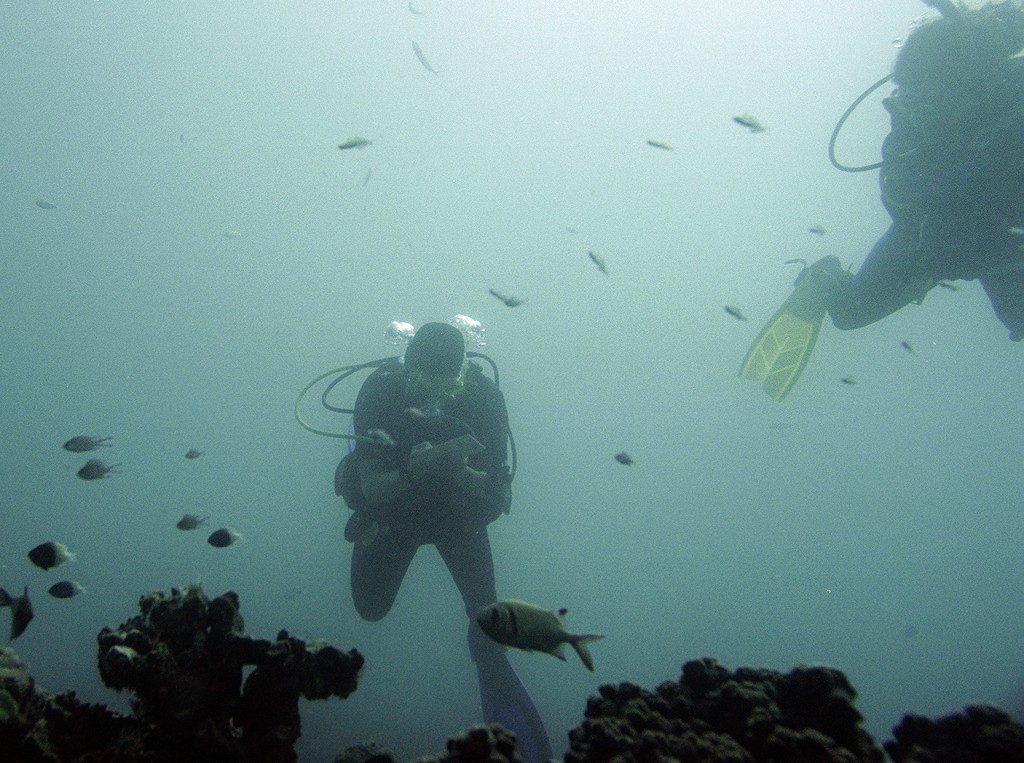By Roger Vaughn, Blue Ventures volunteer, Belize
Check my gear. Check my air. Check my buddy.
DIVERS ON THE SIDE….3…2…1…ROLL IN
OK the boat, check the time, OK my buddy, and descend.
This sequence commences every dive here at Bacalar Chico Nature Reserve, but today is my first data collection dive. Following two pretty intense weeks of training in dive skills, species identification and science methodology, I am about to start achieving the main goal of my trip here with Blue Ventures – contributing to the scientific research that works towards improving reef health.
Check my air, check my buddy, check my compass.
I record the time, depth and water temperature; then start to extend my 30m tape measure whilst swimming slowly and recording the size and numbers of any of the 75 fish species I have learned are important to reef health or the local economy. My buddy, swimming behind me, will carry the surface marker that helps the boat marshal track our position. She will be searching for and recording any of the 6 significant invertebrates we have learnt, or ‘spineless wonders,’ including conchs and lobsters. She will also keep an eye out for any of the bigger reef creatures of interest – the barracudas, jacks, and the occasional porpoise or turtle, and note their sizes and at what depths.
Check my air, check the time, check my buddy.
We have time and air enough, so we change roles as she lays out another tape parallel to mine and 5m or more away.
Check my air, check the time, check my buddy.
We have 10 minutes left of our planned dive time to roll up our two tapes, pull out my underwater camera and try to get some pictures of fish, coral and each other before ascending slowly to our 3 minute safety stop. From there, we will surface and be picked up by the boat. On return to camp, we change tanks to be ready for the next dive and have breakfast of homemade tortillas and scrambled eggs with coffee or tea. The next priority is to transfer the information on our underwater slates into the data logbooks. If the weather holds, we’ll get in two more dives today, laying more transects in the same area. Other divers with different training will also be recording coral health and disease statistics, and detailed recordings of the percentage of sea bed covered by hard corals, soft corals, various algae, sand and sea grasses. After dinner, we’ll have the generator up and running so the logged data can be recorded on the camp computer and backed up onto an independent hard drive. As the data is entered, analysis programs begin to read out averages, percentages and ‘health ratings’ for the area we’ve been surveying. I’ve had little science training myself prior to this effort with Blue Ventures, so I feel a real surge of pride that I am contributing to BVs data and next annual report. Last year’s BV report was very well received by the Belize Fisheries Department, and noted to be of a very high standard. This year’s will be even more rigorous and include the beginnings of trend analysis over time. By 9PM when the generator winds down a few hardy souls will stay up to ‘talk story’ and have the one beer allowed on a pre-dive day. I’ll be ready to crash and sleep like a stone, so I can bounce out at 5:30am to do more of the same again.
A beautiful setting, a gorgeous sea, friendly co-workers, supportive staff, lots of learning and worthwhile work, all in the context of diving as often as the weather permits. I can’t imagine a swim-and-stare diving vacation that could possibly compare, at least for me.



I’ve always wanted to go scuba diving! Liked this article a lot